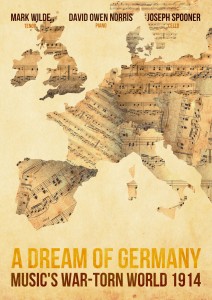Music’s War-Torn World
During the 2014-15 academic year we will be mounting a series of concerts commemorating the Great War. Here our head of keyboard studies, Professor David Owen Norris, explains the background to his upcoming concert ‘Dreams of Germany: Music’s War-Torn World’:
 Mark Wilde (tenor), Joseph Spooner (cello) and I are putting on a day-full of music at St John’s Smith Square, London. It’s called A Dream of Germany – Music’s War-Torn World. We’re presenting a complete and comprehensive series of four concerts in one day on Sunday 5th October 2014 at 11.30am, 3pm, 5pm and 7.30pm. We’ll reprise the set on Saturday 8th November 2014 at 11am, 2pm, 4pm at 6pm, at the church of St John the Evangelist in Oxford.
Mark Wilde (tenor), Joseph Spooner (cello) and I are putting on a day-full of music at St John’s Smith Square, London. It’s called A Dream of Germany – Music’s War-Torn World. We’re presenting a complete and comprehensive series of four concerts in one day on Sunday 5th October 2014 at 11.30am, 3pm, 5pm and 7.30pm. We’ll reprise the set on Saturday 8th November 2014 at 11am, 2pm, 4pm at 6pm, at the church of St John the Evangelist in Oxford.
All through the nineteenth century, the musical links between Britain and Germany had been getting stronger and stronger. There were already German composers in London when the cornerstone of St John’s was laid in 1714 – and that very year the Elector of Hanover arrived as George the First, so Handel and Johann Christian Bach found themselves very much at home here.
But it was Mendelssohn who really got things going – a man so wildly popular that when he premiered his Second Piano Concerto in Birmingham Town Hall it took him three minutes to reach his piano, because the whole orchestra wanted to shake his hand!
Mendelssohn’s disciple William Sterndale Bennett taught Arthur Sullivan, Sullivan became the very first Mendelssohn Scholar, and after that the floodgates opened. Stanford, Parry, Vaughan Williams, all trooped off to study in Germany. Even the impoverished Elgar scraped enough together to spend a few precious weeks in Leipzig. And it was in Leipzig that the music critic Henry Chorley wrote: I am indeed in the musical Germany of which I have so long dreamed.
But the Great War flung an almighty spanner into the works. Friends became enemies almost overnight, and German music was anathema.
Or an alternative front …
ROCK MUSIC BANNED
JAZZ ‘UNPATRIOTIC’ say 99% in new British Poll
BRUCE SPRINGSTEEN deported
SIR PAUL McCARTNEY jailed in New York
Unthinkable? Well, that’s basically what happened in 1914 – except it wasn’t American music that was the problem, it was German music. For more than a hundred years, German music had been as all-pervading in Britain as music of American origin is now. And, just like now, most British musicians didn’t even think of their music as German or American – it was just THEIR music. And suddenly, BAM, you can’t play it any more, and no-one wants to hear it.
We’re giving four concerts that tell the whole story, from Sterndale Bennett’s Sonata Duo for cello and piano to Vaughan Williams’s Four Hymns – composed in 1914, but not performed until the War was over.
Beautiful music, and most of it you’ve probably never heard before. We’ll be talking about it and playing some of it on Radio 3’s In Tune on October 1st. You can watch our promotional video here.

